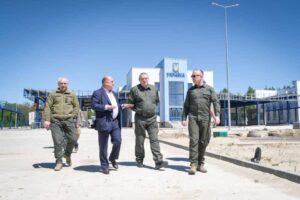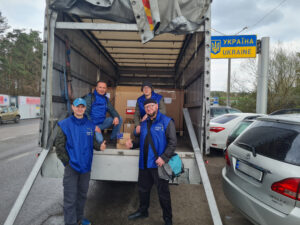
The EU will finance the reconstruction of Dyakovtsy and Koasnoilsk checkpoints on the Ukrainian-Romanian border, the State Customs Service reported.
As the Telegram service indicated on Thursday following a working meeting with the head of the Romanian customs, Bogdan Migei, EU funding will be directed to building infrastructure for trucks from the Ukrainian side.
At the same time, the customs did not specify the amount of funding that would be required for these works.

JSC Ukrzaliznytsia notes a number of problems on the part of the transport system of European countries, which prevent increasing the volume of cargo transportation by rail from Ukraine to Europe.
“The set of technical problems is that the transport system of European countries is not technically ready to transport such large volumes. It needs additional rolling stock: wagons and locomotives,” Deputy Director of the Department of Commercial Work at Ukrzaliznytsia Valeriy Tkachev said at the “Economics of War: May Review and Focus on Infrastructure” conference.
According to him, today Ukrzaliznytsia transports cargo using only 2,000 wagons, or about 130,000 tonnes of cargo per day at the western border crossings, which is approximately equal to 3.8 million tonnes of cargo per month. At the same time, Ukrzaliznytsia’s own capacities allow using 3,422 railcars, or 220,000 tonnes per day.
According to the Ukrainian railway operator, the root of the problem is that the railway infrastructure of Ukraine and Europe is significantly different in gauge. And for the exchange of goods between these two infrastructures, there are only two ways: to reload at the border or to change the wagon bogie. At the same time, Ukrzaliznytsia said that there are not enough transshipment terminals.
“Besides, the most acute problem is the number of wagons on 1,435 mm European gauge track. That is, we, for our part, can transport a much larger volume of cargo, but there is a problem either with a lack of transshipment capacity, or a problem of the availability of European wagons,” Tkachev said.
He also said that there is another technical problem, which is that the infrastructure of European countries has a limited capacity, since it was built for the needs of intra-European transport.
“In Europe, the share of railway transportation of the overall structure of the transport system is 15-35%, while we have 65%. Therefore, the European infrastructure was not initially designed for such large volumes of cargo transportation by rail,” he said.
According to Tkachev, the growth rate of railway transportation is also affected by organizational issues of business, which for many years has been building supply chains towards ports and which now needs to reorient towards border railway crossings.
“Now we have already accumulated 34,000 wagons in the network, which are loaded and are waiting to cross the border,” Tkachev said.
In addition, the presence of a number of red tape procedures at the border, in particular, repetitive procedures of phytosanitary and veterinary control, significantly slows down cargo transportation.
At the same time, the growth in railway transportation continues to recover: according to Tkachev, Ukrzaliznytsia transported 416,000 tonnes of agricultural products in March, and 638,000 tonnes in April. The goal of Ukrzaliznytsia is to reach 1-1.5 million tonnes per month of export of grain products.

The volume of electricity exports from Ukraine to the European Union can replace approximately 17% of the Russian gas consumed by European countries, the Ministry of Energy believes.
“According to our estimates, electricity from Ukraine can replace approximately 17% of Russian gas exported to the EU,” Deputy Minister of Energy of Ukraine Mykola Kolesnyk said during a speech at the 25th Gazterm-2022 conference held in Poland on May 16-17.
According to the ministry, Ukraine submitted its proposals to the European strategy REpowerEU, which provide for practical steps to use the export capacity of the Ukrainian energy system.
“The new REpowerEU strategy should provide clear solutions in three aspects: how to replace Russian energy, how to end Russian control over energy assets in Europe, and how to ensure that this situation does not happen again,” the official said.
At the same time, the deputy minister emphasized the need for decisive action by the governments of European states regarding the complete rejection of Russian energy sources, noting that Ukraine remains a reliable partner of Europe in the energy sector and is ready to make a significant contribution to the reliability of natural gas supplies to European countries.
In particular, he drew attention to the possibility for European companies to use half of the capacity of Ukraine’s underground gas storage facilities (about 15 billion cubic meters) for seasonal or strategic gas reserves, which Energy Minister Herman Haluschenko announced in early May.
As reported, the Ukrainian government plans to resume the operation of additional transmission lines with Poland for the export of Ukrainian nuclear energy.

The European Union donated communication equipment to the National Police of Ukraine (NPU) and the State Border Guard Service (SBGS) worth over EUR 200,000.
Apart from the daily essential services, the NPU and SBGS are courageously defending Ukraine and insuring protection of its citizens. This donation is one of many that will enhance communication and coordination between the law enforcement agencies; it adds to the resilience of Ukraine in the face of Russia’s ongoing military invasion.
“The support from international partners is extremely important to us, because there is often a lack of any technical communication capabilities in regions where active hostilities continue. This equipment will enable the use of encrypted communication channels. Thanks to the technical support received, we have provided three regions and several National Police units with high-quality stable communication,” said Leonid Tymchenko, Head of NPU’s Department of Information and Analytical Support.
The NPU received nearly 600 items worth EUR 205,000. The SBGS obtained about 30 items worth more than EUR 10,000.
The donation comes as one of many delivered within the PRAVO Police project, which is currently refocused on providing an emergency assistance to Ukraine’s law enforcement and rule of law agencies. The EU project is implemented by UNOPS in close coordination with the EU Advisory Mission (EUAM) Ukraine.

The export of Ukrainian agricultural products through the EU countries, including taking into account deliveries through the Danube river ports, cannot exceed 1.5 million tons per month under any circumstances, while before the blockade of its seaports by the Russian troops, the country could transship more than 5 million tons per month. million tons of agricultural crops per month.
The opinion about the need for Ukraine to work on the launch of new logistics routes and export directions was expressed by First Deputy Minister of Agrarian Policy and Food Taras Vysotsky during the expert discussion “Blocked trade: can Ukraine increase export capacity” on Friday.
“We preliminary calculated that up to one and a half million tons is still the maximum. Therefore, I think that we can count on this until May, and then only alternative directions,” Vysotsky said.
He clarified that Ukraine has enough agricultural products for export, and Ukrainian farmers can supply as much grain as they need to foreign markets, and the volume of its exports is limited only by logistics.
As reported with reference to the Minister of Agrarian Policy Mykola Solsky, in April 2022 Ukraine exported 1.09 million tons of grain mainly through Romanian ports, which is more than five times higher than in March.
According to him, most of the export deliveries from Ukraine were carried out in April through the river ports of the Danube, since the Ukrainian Black Sea ports are blocked by Russian warships.
At the same time, the logistics of Ukrainian agricultural products through Romania may become more complicated and slow down in June, when a new crop of Romanian, Serbian, Hungarian and Bulgarian winter wheat and barley will begin to arrive at the seaports of this country and will create competition with supplies from Ukraine.